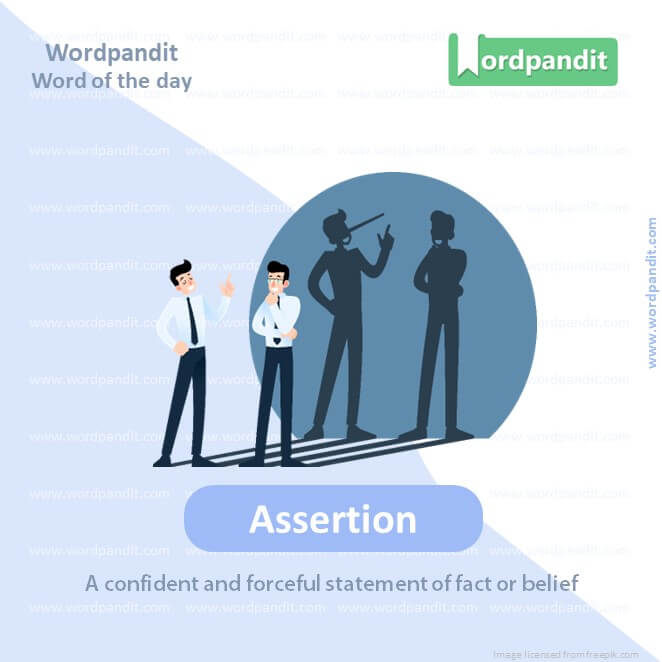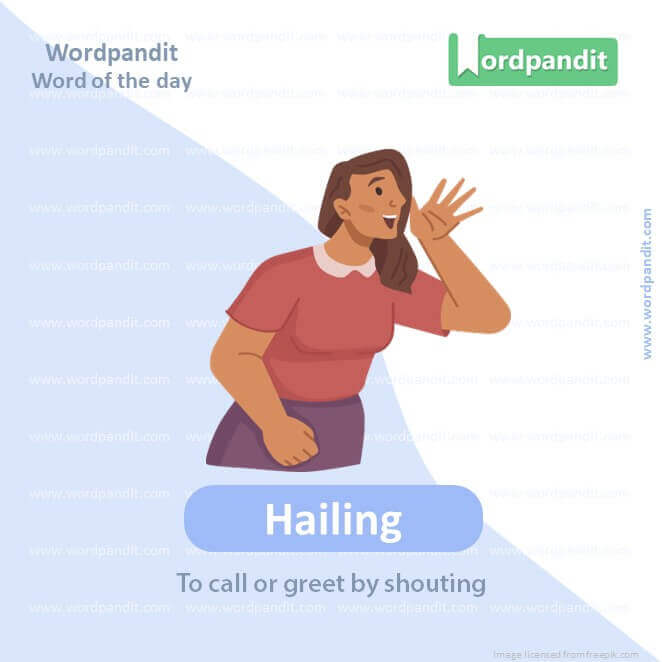Daily Vocabulary Words: List of Daily Used Words
Hi there. Welcome to this special section @ Wordpandit.
Our endeavour here is straightforward: highlighting important daily vocabulary words, you would encounter in The Hindu. This is your repository of commonly used words; essentially, we are posting a list of daily used words. Hence, this has significant practical application as it teaches you words that are commonly used in a leading publication such as The Hindu.
Visit the website daily to learn words from The Hindu.
WORD-1: POLARISED
CONTEXT: The political landscape of the nation has become increasingly polarised over the past decade, with both major parties accusing each other of widening the divide.
SOURCE: The Hindu
EXPLANATORY PARAGRAPH: Imagine if you and your friend really like different flavors of ice cream. You love chocolate, and your friend loves vanilla. It’s like you both have opposite opinions about what’s best. When people have opposite opinions like this, we can say they are polarized.
MEANING: When people have very different opinions or ideas and can’t agree on something (adjective).
PRONUNCIATION: POH-luh-ryzed
SYNONYMS: divided, split, opposing, conflicting, differing
USAGE EXAMPLES:
1. The class was polarized between those who wanted pizza and those who preferred burgers for lunch.
2. The debate became polarized when they discussed the best superhero.
3. Polarized opinions can make it hard to make decisions together.
4. Let’s find a way to agree and not be so polarized about which game to play.

WORD-2: ASSERTION
CONTEXT: The foreign minister made a strong assertion about the country’s sovereign rights over the disputed territory, emphasizing its historical and legal claim.
SOURCE: The Hindu
EXPLANATORY PARAGRAPH: Assertion is when you say something in a strong and confident way, like when you tell everyone that your teddy bear is the best teddy bear in the world because you really love it.
MEANING: A confident and forceful statement of fact or belief (noun).
PRONUNCIATION: uh-SUHR-shuhn
SYNONYMS: declaration, statement, claim, affirmation, proclamation
USAGE EXAMPLES:
1. Her assertion that she could climb the tree without help was brave.
2. The teacher made an assertion that reading is important for learning.
3. Sometimes, an assertion is like saying, “I know this is true!”
4. His assertion of being the fastest runner in the class made everyone laugh.
WORD-3: UNCIVIL
CONTEXT: The parliamentary debates took an uncivil turn yesterday when members of the opposition and the ruling party engaged in a heated verbal exchange.
SOURCE: The Hindu
EXPLANATORY PARAGRAPH: Being uncivil is like not using your nice words and actions. It’s when you forget to say “please” and “thank you” or when you’re not friendly and kind to others.
MEANING: Not being polite or using good manners; not being friendly and nice (adjective).
PRONUNCIATION: un-SIV-ul
SYNONYMS: impolite, rude, discourteous, disrespectful, ill-mannered
USAGE EXAMPLES:
1. It’s important to be civil and kind to everyone.
2. His uncivil behavior upset the other kids at the playground.
3. Using bad words is an example of being uncivil.
4. Let’s remember to be civil and say “please” when we ask for something.

WORD-4: EXTORTION
CONTEXT: A prominent businessman was arrested yesterday over allegations of extortion and blackmail, sending shockwaves through the city’s business community.
SOURCE: The Hindu
EXPLANATORY PARAGRAPH: Extortion is when someone tries to make you do something you don’t want to do by scaring you or making threats, like a villain in a superhero movie.
MEANING: The practice of obtaining something, especially money, through force or threats (noun).
PRONUNCIATION: ik-STAWR-shuhn
SYNONYMS: blackmail, coercion, intimidation, threat, pressure
USAGE EXAMPLES:
1. The superhero saved the city from the villain’s extortion attempts.
2. Extortion is a bad thing because it’s like forcing someone to do something.
3. If someone tries to take your lunch money and says mean things, it’s a form of extortion.
4. Always tell a grown-up if you think someone is trying to use extortion on you.

WORD-5: HAILING
CONTEXT: Hailing from a small village in Tamil Nadu, the young prodigy astonished everyone with her exceptional mathematical abilities.
SOURCE: The Hindu
EXPLANATORY PARAGRAPH: Hailing is when tiny bits of ice fall from the sky, like frozen raindrops. It’s like when you catch snowflakes on your tongue.
MEANING: To call or greet by shouting (verb).
PRONUNCIATION: HAY-ling
SYNONYMS: none (specific term)
USAGE EXAMPLES:
1. Look, it’s hailing outside! Let’s watch from the window.
2. Hailing can make the ground look white, just like snow.
3. Hailing can be noisy when it hits the roof.
4. We need to wear our warm coats when it’s hailing.
WORD-6: SHROUDED
CONTEXT: The circumstances surrounding the sudden resignation of the finance minister remain shrouded in mystery, leading to widespread speculation.
SOURCE: The Hindu
EXPLANATORY PARAGRAPH: Imagine you have a special, secret treasure box. You don’t want anyone to see what’s inside, so you wrap it in a big, dark, mysterious cloak. That’s what shrouded means—covering something up or hiding it like a secret.
MEANING: When something is hidden or covered, like a secret, by wrapping it in darkness or mystery (verb).
PRONUNCIATION: SHROW-ded
SYNONYMS: concealed, covered, veiled, hidden, obscured
USAGE EXAMPLES:
1. The mystery novel shrouded the identity of the thief until the end.
2. She shrouded her feelings with a
smile, even though she was sad.
3. The ancient castle was shrouded in legends and ghost stories.
4. The magician shrouded the object in a thick fog before making it disappear.

WORD-7: DEMOLISH
CONTEXT: The ancient temple, which had stood for over a thousand years, was unfortunately demolished to make way for a new highway, sparking outrage among heritage activists.
SOURCE: The Hindu
EXPLANATORY PARAGRAPH: Demolish is like when you’re playing with building blocks, and you knock down the tower you just built. It means to break something into pieces or tear it down.
MEANING: To destroy or tear down completely (verb).
PRONUNCIATION: dih-MOL-ish
SYNONYMS: destroy, wreck, flatten, tear down, ruin
USAGE EXAMPLES:
1. The wrecking ball was used to demolish the old building.
2. He accidentally stepped on his sandcastle and demolished it.
3. Demolish means to make something go away, like when we clean up our toys.
4. The construction crew will demolish the old bridge to build a new one.
WORD-8: INDICTMENT
CONTEXT: The indictment of the former mayor on charges of corruption and money laundering has thrown the city’s political scene into chaos.
SOURCE: The Hindu
EXPLANATORY PARAGRAPH: Indictment is like when a detective thinks they have enough clues to say that someone might have done something wrong. It’s like saying, “We think you did it, and now we’ll have a trial to find out.”
MEANING: A formal accusation that someone has committed a crime or done something wrong (noun).
PRONUNCIATION: in-DYT-muhnt
SYNONYMS: accusation, charge, allegation, complaint, accusation
USAGE EXAMPLES:
1. The police filed an indictment against the suspect for stealing the jewels.
2. An indictment is like saying, “We believe you did this, and we’ll check in court.”
3. The lawyer defended her client against the indictment.
4. In a mystery story, the indictment often comes before the trial.
WORD-9: FIG-LEAF
CONTEXT: Critics argue that the new policy is nothing more than a fig-leaf, offering superficial solutions to deeply entrenched problems.
SOURCE: The Hindu
EXPLANATORY PARAGRAPH: A fig-leaf is like using a big leaf from a plant to cover something you don’t want others to see, just like when you hide behind a blanket during a game of hide and seek.
MEANING: A large leaf, often from a fig tree, used to cover or hide something, especially in art or as a symbol (noun).
PRONUNCIATION: fig leef
SYNONYMS: none (specific term)
USAGE EXAMPLES:
1. In some old paintings, artists used a fig-leaf to cover private parts.
2. Adam and Eve are sometimes shown wearing fig-leaves in pictures to hide their bodies.
3. When playing dress-up, you can pretend a big leaf is a fig-leaf.
4. The statue’s modesty was preserved with a strategically placed fig-leaf.

WORD-10: EMBARGO
CONTEXT: In response to the escalating crisis, the international community imposed a strict embargo on trade, hoping to pressure the regime into negotiations.
SOURCE: The Hindu
EXPLANATORY PARAGRAPH: Imagine you have a big box of toys, and you decide not to share any of them with your friends. You put your toys away and say, “No one can play with these!” That’s like an embargo—it’s when a country or group of people decides not to share things with another country for a while.
MEANING: An official ban on trade or other commercial activity with a particular country or the exchange of specific goods (noun).
PRONUNCIATION: em-BAR-goh
SYNONYMS: trade ban, blockade, restriction, prohibition, ban
USAGE EXAMPLES:
1. The country imposed an embargo on certain goods from their neighbor.
2. An embargo is like saying, “We won’t share our toys with you for a while.”
3. The embargo was lifted, and trade between the two countries resumed.
4. Embargoes can be used to encourage other countries to change their behavior.











